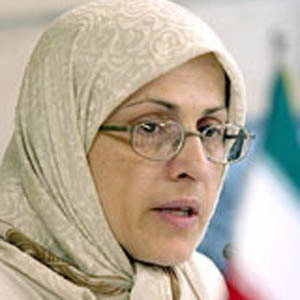South Ossetia War and Russia’s Effort to Restore Hegemony
Iranian Diplomacy has interviewed Elaheh Koulayi, university professor and expert in Central Asian and Caucasian affairs on these developments:

v
United States believes that Russia wants to remove Georgia’s legitimate government. The same belief is held by Georgia. What is the ultimate goal Russia is seeking?
Russia’s military action in South Ossetia that is a part of the Georgian territory and an autonomous republic shows how sensitive former Soviet Union republics, and Caucasus in particular, are for Russia. In the early years after USSR dissolution, the pro-West circle in Moscow argued that these republics have become independent and could operate under the umbrella of Commonwealth of Independent States (CIS). But neighborhood realities changed their mentality and once again during the 1990s Russia’s vital interests in these areas were highlighted. Russia considered these countries as its backyard and economic, cultural and political ideology bounds of the Soviet era could help Russia in this line. So the crisis between Russia and Georgia can be analyzed within this framework; i.e. Russia’s permanent interests in the region.
Since the start of clashes between Russia and Georgia, UNSC held five sessions without any result. The reason, some believe, is that resolutions would lead to U.S. intervention, just like Iraq and Afghanistan. How do you see that?
Russia is a veto-wielding member of the Security Council. So it’s really simplistic thinking the Council could act against Russia. The country will not vote against itself and every decision UNSC wants to make will be controlled by Russia.
Russians assume a special right for themselves in Caucasus and Central Asia. Some even talk of a Russian Monroe Doctrine, just like United States declaring opposition to European interference in the Americas. But Americans do not accept this view. In fact, after Soviet Union’s dissolution, while Russians claimed this region as sphere of their vital interests, Americans acted reversely, trying to contain Russia inside its borders and preclude its chance for restoring hegemony in Central Asia and Caucasus.
So we are witnessing return of Cold War clichés, albeit in new circumstance and UNSC doesn’t look like an effective tool for resolving these types of confrontation, unless Russians achieve the goals they’re seeking. Similarly, it was Shevardnadze’s surrender to demand for it becoming a CIS member that Russia stopped its support for Abkhazian separatists. Any kind of change depends on objectives Russia attains through bargain or pressure.
How will Russia-U.S. relations change after this conflict?
Russia-U.S. relations have changed significantly during the recent years and the trend seems to continue. The changes are outcome of a turn in Russia’s mindset towards the world and its own position.
We can even say that if the Georgian leadership had paid due attention to Russia’s behavior in Chechnya, it could predict Russia’s behavior and the heavy tolls would have been avoided. It is clear that Russia reacts to any military move intensely.
In fact, the crisis was Russia’s demonstration of power in its sphere of vital interest. In Russia’s new strategy of foreign diplomacy, stricter and more stable policies have been promoted to fulfill its interests. Therefore, Russians will continue their simultaneous cooperation and contention with United States, since they are aware of their need to global community, United States and Europe and do not want to disturb the game.
With the current conditions in Caucasus, Americans must consider Russians’ role more seriously and attend their demands. Russians will naturally use their potentials to advance this game of cooperation and contention. We can wait for new fields to open in bilateral ties of Russia and the United States.
How will power equations change for America in former Soviet republics after the war between Russia and Georgia?
I don’t think we should await substantial changes in Central Asia. The current order has formed through years and will continue to exist. Both United States and Russia will seek tools and capabilities that empower them in their interaction and benefit them more, so it seems that fields of competition will increase and United States has to cope with Russia and its position in global and regional affairs. As we saw, the whole project of colored revolutions has stopped since the setting and circumstances of such behaviors have been detected.
Russia-U.S. ties are going to enter a new phase. In line with preserving its interests, Russia will have a more significant presence in its periphery, especially Central Asia, Caucasus and the Caspian region. This will not be free of consequences for Iran.
During the Georgia-Russia conflict Iran didn’t take a significant stance. Will the recent developments have any particular aftermath, and can Iran use the recent developments to play a different role with regard to its relations with Russia and West?
Because of its unique geographical situation (Iran is Russia’s neighbor in the Caspian region and it is the southern neighbor of former Soviet republics) Iran faces various developments, opportunities and threats, of course if it takes a realistic stance, based on geopolitical developments.
Iran’s geopolitical realities make it able to play a balanced game with regional and global powers. If instead of relying on any of the powerful global players Iran sets a balanced relation with regional and global actors, including Russia, the procedure will bring remarkable achievements for Iran. But if it thinks one single actor can fulfill its interests, I think the chances and opportunities will be used by other countries.
Keywords: Georgia-Russia war. Iran-Russia relations. United States.

